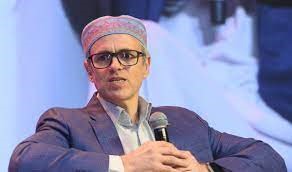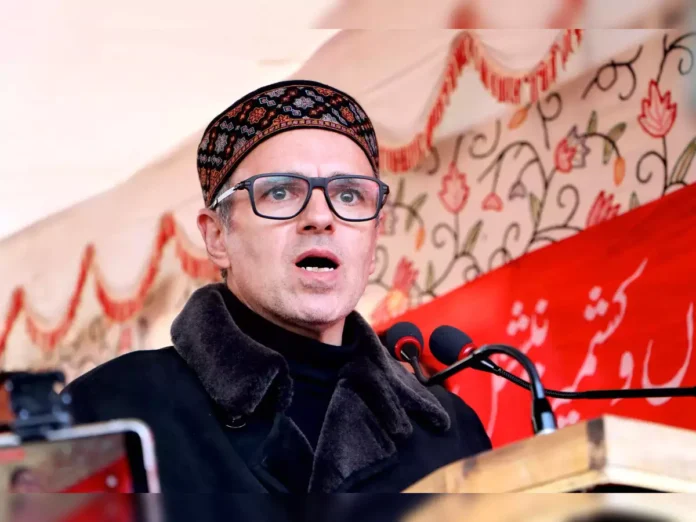Introduction Omar Abdullah
The political landscape of Jammu and Kashmir (J&K) has always been complex, shaped by its unique history, strategic importance, and the ongoing conflict between regional aspirations and national interests. The abrogation of Article 370 and the bifurcation of the state into two Union Territories in August 2019 marked a significant shift in the region’s political framework. As the region moves towards potential assembly elections, one of the critical voices in J&K politics, Omar Abdullah, has weighed in on what should be the first move of the newly elected assembly. This analysis delves into Omar Abdullah’s perspective on the matter, the historical context, and the potential implications of his proposed actions.
Background on Omar Abdullah and J&K Politics
Omar Abdullah, a prominent political figure in Jammu and Kashmir, served as the Chief Minister of the erstwhile state from 2009 to 2015. He is a leader of the National Conference (NC), a party that has historically been central to J&K’s political landscape. His political lineage is significant, being the son of Farooq Abdullah and the grandson of Sheikh Abdullah, both of whom played pivotal roles in J&K’s history.

The National Conference, like other regional parties in J&K, has traditionally advocated for greater autonomy for the region, reflecting the unique identity and aspirations of its people. The party’s stance on the abrogation of Article 370 and the reorganization of the state has been one of strong opposition, viewing it as an erosion of J&K’s special status and a breach of trust between the region and the Union of India.
The take-off of the journey in the annals of politics: Scrapping of article 370 and its consequences
The abrogation of Article 370, which granted special autonomy to J&K, and the bifurcation of the state into the Union Territories of Jammu & Kashmir and Ladakh, were watershed moments in the region’s history. The move was met with widespread criticism and protests within the region, as well as by political leaders like Omar Abdullah. The central government’s justification for the abrogation was to fully integrate J&K into India, promote economic development, and address the issue of militancy.
However, the aftermath of this decision has been marked by political instability, with the region being placed under a heavy security blanket, political leaders being detained, and a communication blackout being imposed. The political process in J&K has been at a standstill, with no elected government in place since the dissolution of the assembly in 2018. The prospect of assembly elections is now being discussed, and there is anticipation regarding what the newly elected assembly’s priorities should be.
Omar Abdullah’s Perspective: Restoring J&K’s Special Status
Omar Abdullah has consistently argued that the first move of the J&K Assembly after the polls should be to restore the region’s special status, which was nullified by the abrogation of Article 370. He believes that the abrogation was done unilaterally, without the consent of the people of J&K or its elected representatives, and therefore lacks legitimacy.
Legal and Constitutional Challenges
One of the primary actions Omar Abdullah advocates for is the legal challenge to the abrogation of Article 370. He contends that the manner in which Article 370 was abrogated – by the Parliament of India, without the consent of the J&K Assembly – was unconstitutional. According to him, the reestablishment of the state’s special status should be a top priority, and the assembly should pass a resolution demanding the restoration of Article 370 and Article 35A.
The legal challenge would involve not only the state assembly but also a concerted effort in the courts, possibly leading to the Supreme Court of India. Omar Abdullah argues that a robust legal strategy, backed by the mandate of the people through the assembly, would be critical in challenging the constitutional validity of the abrogation.
Reaffirming J&K’s Identity
For Omar Abdullah, the restoration of Article 370 is not just a legal or political issue but also one of identity. He argues that the special status was a reflection of J&K’s unique history, culture, and circumstances of its accession to India. The removal of this status, according to Abdullah, has led to a crisis of identity among the people of J&K, who feel that their distinctiveness is being eroded.
He believes that the assembly should work towards reaffirming J&K’s identity by not only seeking the restoration of special status but also by promoting policies that reflect the aspirations of its people. This includes protecting the demographic composition of the region, preserving its cultural heritage, and ensuring that the rights and privileges that were earlier accorded under Article 35A are reinstated.
Addressing Governance and Development
While Omar Abdullah places significant emphasis on the restoration of J&K’s special status, he also acknowledges the importance of addressing governance and development issues in the region. The abrogation of Article 370 was justified by the central government on the grounds that it would lead to better governance and faster economic development. However, the region has continued to face challenges on these fronts, exacerbated by the political vacuum and security situation.
Restoring Democratic Governance
One of the first steps Omar Abdullah advocates for is the restoration of full democratic governance in J&K. The region has been under central rule for an extended period, and the absence of an elected government has created a disconnect between the people and the administration. The newly elected assembly, according to Abdullah, should prioritize re-establishing democratic processes, including holding local body elections and ensuring that the voice of the people is heard in governance.
He also emphasizes the need for transparency and accountability in governance. The assembly should focus on strengthening institutions, ensuring the rule of law, and addressing issues of corruption and inefficiency in the administration. This would require a collaborative approach, with all political parties working together to rebuild trust in the democratic process.
Economic Development and Employment
Omar Abdullah has pointed out that the promises of economic development following the abrogation of Article 370 have largely remained unfulfilled. The region continues to face high unemployment rates, particularly among the youth, and the economy has been hit hard by the lockdowns and security measures imposed in the aftermath of the abrogation.
The assembly should focus on creating an environment conducive to economic growth, attracting investment, and promoting job creation. This could include measures such as offering incentives for businesses to set up in J&K, improving infrastructure, and promoting sectors like tourism, agriculture, and handicrafts, which have traditionally been the backbone of the region’s economy.
Abdullah also stresses the importance of ensuring that the benefits of development reach all sections of society, including marginalized and vulnerable communities. This would involve targeted interventions to improve education, healthcare, and social welfare, as well as efforts to bridge the gap between urban and rural areas.
Security and Human Rights
The security situation in J&K remains a significant challenge, with ongoing militancy and frequent clashes between security forces and militants. Omar Abdullah has often criticized the heavy-handed approach of the central government, arguing that it has led to human rights violations and alienated the local population.
A Balanced Security Approach
Abdullah advocates for a balanced approach to security, one that addresses the root causes of militancy rather than relying solely on force. He believes that the assembly should work towards creating a more humane and just security policy, which includes engaging with disaffected youth, addressing grievances, and promoting reconciliation.
This approach would involve building trust between the security forces and the local population, ensuring that operations are conducted with respect for human rights, and providing avenues for dialogue and conflict resolution. The assembly could play a crucial role in advocating for policies that prioritize the safety and dignity of the people while also addressing the security challenges in the region.
Human Rights and Justice
Human rights have been a contentious issue in J&K, with allegations of extrajudicial killings, arbitrary detentions, and other abuses. Omar Abdullah has called for the establishment of a commission to investigate these allegations and ensure accountability. He believes that justice and reconciliation are essential for long-term peace in the region.
The assembly should focus on strengthening institutions like the State Human Rights Commission and ensuring that they are empowered to investigate and address human rights violations. It should also work towards implementing measures that protect the rights of all citizens, including ensuring freedom of expression, assembly, and movement.
Building a Consensus for the Future
Omar Abdullah recognizes that the challenges facing J&K are complex and cannot be addressed by any one party or leader alone. He advocates for a consensus-based approach, where all stakeholders, including political parties, civil society, and the people, come together to chart a path forward for the region.
Dialogue and Reconciliation
Abdullah has long been a proponent of dialogue and reconciliation as the way forward for J&K. He believes that the assembly should take the lead in facilitating dialogue between different communities, regions, and political groups within J&K, as well as with the central government. This dialogue should be aimed at addressing the root causes of conflict, building trust, and finding a mutually acceptable solution to the region’s challenges.
He also emphasizes the need for reconciliation, both within J&K and between J&K and the rest of India. This could involve initiatives to heal the wounds of the past, such as truth and reconciliation commissions, as well as efforts to promote greater understanding and cooperation between different communities.
Regional Cooperation
Omar Abdullah has also pointed out the importance of regional cooperation in addressing the challenges facing J&K. The region is strategically located, with borders with Pakistan and China, and has historically been a gateway for trade and cultural exchange. He believes that the assembly should work towards promoting regional cooperation, particularly in areas like trade, tourism, and environmental protection.
This could involve initiatives to open up trade routes, promote cross-border tourism, and collaborate on issues like water management and climate change. By fostering regional cooperation, the assembly could help create a more stable and prosperous future for J&K and its neighbors.
Conclusion
Omar Abdullah’s vision for what the J&K Assembly’s first move should be after the polls is rooted in his commitment to the region’s identity, autonomy, and well-being. He advocates for the restoration of J&K’s special status, along with addressing governance, development, security, and human rights issues. His approach is one of reconciliation, dialogue, and consensus-building, recognizing the complexity of the challenges facing the region.
The potential assembly elections in J&K will be a crucial moment for the region, offering an opportunity to restore democratic governance and address the pressing issues facing its people. The actions of the newly elected assembly will have far-reaching implications, not only for the future of J&K but also for the broader relationship between the region and the Union of India. As such, the assembly’s first move, as envisioned by Omar Abdullah, will be closely watched by all stakeholders, both within and outside the region.



